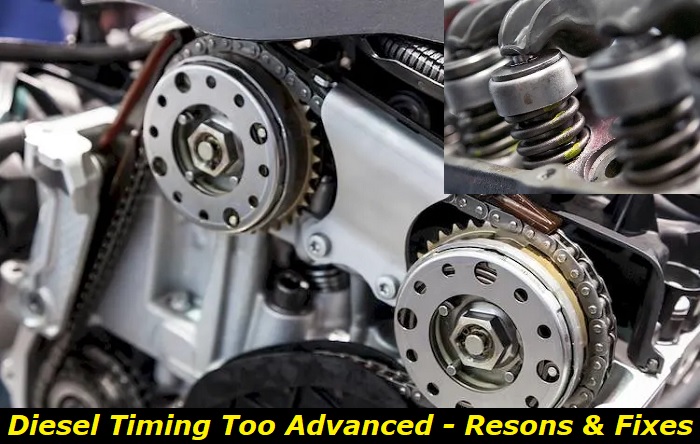From one angle, having advanced diesel timing can bring in a lot of advantages when it comes to fuel efficiency and engine power. However, as the saying goes, "Too much of anything is bad for you", or in this case, bad for your vehicle.
Diesel engine problems highlights
- Level of importance:Medium
- Commonreasons:Age and mileage, aggressive driving, poor maintenance
- DIY inspection:In most cases, impossible
- DIY repair:Impossible
- Price for repair:$650 - $1,500
- Can you drive?Depends on the issue
- Ways to fix:Replace the worn-out parts, professionalrepair is usually possible only

Benefits of Advancing the Diesel Timing
Advancing the diesel timing system if done correctly can extend the life of an engine due to its more precise control over fuel injection and combustion. It produces more power, greater efficiency, and improved reliability because it helps ensure that the fuel is being injected at the optimum time for maximum efficiency and output.
Its main disadvantages, in this case, are increased complexity and cost associated with the installation of this type of system, as well as higher emissions levels during operation. Additionally, it can be difficult to adjust and tune for specific applications, requiring additional skill on the part of a mechanic or technician to get optimal performance out of the system. As such, advanced diesel timing systems should be installed only in vehicles that will benefit from their precision control over fuel injection.
The most noteworthy effects of advanced diesel timing are more powerful performance, improved fuel economy, and increased longevity of the engine. The precision control afforded by this type of system also leads to smoother running and longer engine life as it ensures that combustion is occurring in an optimum manner.
In addition, less smoke will be emitted from the exhaust due to the precise regulation of fuel injection. Finally, drivers may experience better handling characteristics as a result of being able to precisely adjust the timing for specific applications.
Overall, advanced diesel timing systems can provide significant improvements to engine performance and life if they are properly installed and adjusted.
However, they do come with increased complexity and cost so their use should be carefully considered before installation. In cases where they are the optimal solution, they can provide significant benefits to the performance of an engine.
Ultimately, it is up to the owner or mechanic to decide if their particular application would benefit from this type of system. If so, then advanced diesel timing can offer great improvements in many areas. For those looking for a more powerful and efficient engine, it is certainly worth considering as an option.
Why Having Too Advanced Diesel Timing Can Be a Bad Thing
On the other end of the spectrum, having too advanced diesel timing in an engine can lead to various negative symptoms. Despite the perceived advantages at first, this can generate major problems in the long run.
Some of the symptoms pointing out that your engine may have taken a toll due to this condition include excessive smoke from the exhaust, poor fuel economy, and decreased performance. In extreme circumstances, having too advanced timing can even cause severe engine damage due to pre-ignition or pinging. Having too advanced diesel timing also increases the risk of knocking or detonation which could potentially damage your engine's pistons and bearings.
Having slightly more advanced diesel timing than recommended by the manufacturer might yield some benefits such as increased torque and power output as mentioned earlier. However, it is important that you take into consideration all of the potential risks before making any changes to your engine's timing settings as this can have serious consequences.
If you do decide to adjust the timing, it is important that you use a quality timing light and all of the proper tools, as well as follow the manufacturer's recommendations closely.
Possible Causes of Diesel Timing Getting Too Advanced
Some factors may cause the diesel timing to go too advanced without adjusting the settings of your fuel system. Diesel timing can go too advanced in an engine if the fuel injection pump is set incorrectly. If the fuel injection pump is not calibrated properly, it can inject too much fuel at a higher pressure than what is needed for the engine to run efficiently.
This will cause the timing to become more advanced than normal and, as a result, lead to increased emissions and decreased performance.
Other potential causes of overly-advanced diesel timing include worn or damaged parts such as fuel injectors, cam followers, camshafts, and cylinder head components. These parts can wear over time due to heat and friction from use, leading them to malfunction or break down completely. Additionally, any debris that gets into the system through contaminated fuel injections will further increase wear on these components and cause timing to become more advanced.
To prevent diesel timing from going too advanced, it is important to ensure that all the parts of the fuel injection system are set correctly and regularly serviced as well as keeping the system free from debris and other contaminants.
Additionally, checking for wear and replacing any worn or damaged parts will help to keep the engine running smoothly. Regular maintenance of your engine components can also extend their lifespan and improve performance in the long run.
Properly calibrating fuel injection pumps, keeping your engine clean, and properly maintaining all of its components are essential steps in preventing diesel timing from getting too advanced.
In a nutshell, diesel timing can go too advanced in an engine if the fuel injection pump is set incorrectly or if parts become worn or damaged. To prevent this from happening, it is important to properly calibrate fuel injection pumps and regularly maintain your engine components to ensure that they are in good condition.
Additionally, keeping the system clean and free of debris will help reduce wear and tear on these parts, leading to improved performance and lower emissions. With regular maintenance and proper care, you can extend the lifespan of your engine components while also avoiding any issues with overly-advanced diesel timing.
Fixing Too Advanced Diesel Timing Via Engine Retardation
Engine retardation, also known as ignition timing control or spark advance and retard, is another technique that can be employed to prevent diesel engines from running with their timing too advanced.
When the timing of an engine is set too far in advance, it can cause excessive fuel consumption, decreased power output, poor emissions performance, and even major damage to internal components such as the pistons and spark plugs.
This problem can usually be fixed by using engine retardation to adjust the amount of time between when the spark plug ignites the air-fuel mixture in the combustion chamber and when the piston reaches its optimal position for this specific pressure.
For a professional mechanic to properly execute engine retardation on a diesel engine, they must first identify the current timing setting. This can be done by using a timing light tool to measure the exact time that it takes for the spark plug to ignite the air-fuel mixture in the combustion chamber when compared to when the piston reaches its optimal position at the top dead center (TDC).
If this measurement shows that there is too much of an advance, then engine retardation must be performed.
Engine retardation involves slowly turning back the engine's distributor cam until it has been adjusted to a more retarded state. This will cause an increase in compression, which should help reduce fuel consumption and emissions output. It also increases power output since more of the air-fuel mixture will be retained inside the combustion chamber before being set off by the spark plug.
Once engine retardation has been performed, the mechanic should measure the new timing setting to make sure that it is correct. If not, further adjustments can be made until the desired result is achieved.
Once this is done, the mechanic will then reset any other relevant engine maintenance schedules and test drive the vehicle to ensure that everything is working properly. If all goes well, the diesel engine should now have a more efficient combustion process and improved overall performance.
Engine retardation is an important technique for diesel engines and should only be performed by experienced mechanics with a thorough understanding of how these systems work.
By following these steps correctly, professional mechanics can help prevent diesel engines from running with their timing set too far in advance and causing various problems such as increased fuel consumption, decreased power output, and poor emissions performance.
In addition, performing engine retardation regularly can also extend the life of the diesel engine by reducing wear on its internal components and ensuring optimal efficiency.
When using engine retardation to fix a diesel timing problem, it is important for mechanics to take their time and adjust the timing very slowly in order to ensure that they are not overshooting the desired setting.
This will help them get the best possible result while minimizing any potential risks that could arise from too much of an adjustment being made at once. With proper care and attention, engine retardation can be used to successfully prevent diesel engines from running with their timing going too advanced.
Conclusion
By ensuring that your diesel engine has the proper timing settings, you can reduce the risk of any potential problems and benefit from improved performance and fuel economy. Ultimately, when it comes to diesel engines, it is always best practice to stick with what the manufacturer recommends rather than trying to make any changes yourself.
With a properly timed engine, you should be able to enjoy a reliable performance for many miles and years to come.
About the authors
The CarAraC research team is composed of seasoned auto mechanics and automotive industry professionals, including individuals with advanced degrees and certifications in their field. Our team members boast prestigious credentials, reflecting their extensive knowledge and skills. These qualifications include: IMI: Institute of the Motor Industry, ASE-Certified Master Automobile Technicians; Coventry University, Graduate of MA in Automotive Journalism; Politecnico di Torino, Italy, MS Automotive Engineering; Ss. Cyril and Methodius University in Skopje, Mechanical University in Skopje; TOC Automotive College; DHA Suffa University, Department of Mechanical Engineering






Add comment